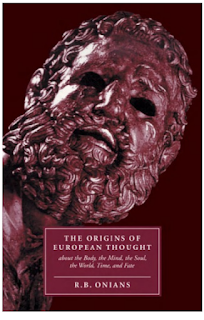R. B. Onians, The Origins of European Thought: About the Body, the Mind, the Soul, the World, Time and Fate, Cambridge University Press, 1954.
Marie-Louise von Franz:
"Then there is a book in which you will find a tremendous amount of valuable material. It is by R.B. Onians and entitled The Origins of European Thought about the body, the mind, the soul, the world, time and fate (Cambridge, 1952). I urge anyone who intends to become an analyst to get that book. Under this funny title any amount of material has been collected on spittle, hair, sneezing, coughing, getting drunk by wetting your lungs, the diaphragm and all its mythological material. Onians is a classical scholar, but he has brought in primitive and comparative religious material, and you can look up every part of the body, as well as the involuntary human actions, such as scratching your belly, and what they mean. The origins of European thought have a strange background! The book has an excellent index, and you will find a lot that you will be able to use in dream interpretation."
Marie-Louise von Franz, An Introduction to the Psychology of Fairy Tales, Spring Publications, 1975.
Samten:
Though this book is called Origins of European Thought, the material presented is universal, and purely archetypal in content. On a deeper level, when Onians introduces Sanskrit terms, we could say that the more complex strata of his material reveals the origins of Indo-European thought, or even PIE, Pre-Indo-European. Unfortunately, much of the material is inaccessible to readers who do not have a working knowledge of classical Greek, as Onians leaves all the terminology under examination in Greek. Nevertheless, one can work around this obstacle, and still gain some valuable insights.
Bruno Snell, The Discovery of the Mind. The Greek Origins of European Thought, Angelico Press, 2013.
"An illuminating and convincing account of the enormous change in the whole conception of morals and human personality which took place during the centuries covered by Homer, the early lyric poets, the dramatists, and Socrates." — The Times (London) Literary Supplement.
European thinking began with the Greeks. Science, literature, ethics, philosophy — all had their roots in the extraordinary civilization that graced the shores of the Mediterranean a few millennia ago. The rise of thinking among the Greeks was nothing less than a revolution; they did not simply map out new areas for thought and discussion, they literally created the idea of man as an intellectual being — an unprecedented concept that decisively influenced the subsequent evolution of European thought.
In this immensely erudite book, German classicist Bruno Snell traces the establishment of a rational view of the nature of man as evidenced in the literature of the Greeks — in the creations of epic and lyric poetry, and in the drama. Here are the crucial stages in the intellectual evolution of the Greek world: the Homeric world view, the rise of the individual in the early Greek lyric, myth and reality in Greek tragedy, Greek ethics, the origin of scientific thought, and Arcadia.
Drawing extensively on the works of Homer, Pindar, Archilochus, Aristophanes, Sappho, Heraclitus, the Greek tragedians, Parmenides, Callimachus, and a host of other writers and thinkers, Snell shows how the Homeric myths provided a blueprint for the intellectual structure the Greeks erected; how the notion of universality in Greek tragedy broadened into philosophical generalization; how the gradual unfolding of the concepts of intellect and soul provided the foundation for philosophy, science, ethics, and finally, religion.
Unquestionably one of the monuments of the Geistegeschichte (History of Ideas) tradition, The Discovery of the Mind throws fresh light on many long-standing problems and has had a wide influence on scholars of the Greek intellectual tradition. Closely reasoned, replete with illuminating insight, the book epitomizes the best in German classical scholarship — a brilliant exploration of the archetypes of Western thought; a penetrating explanation of how we came to think the way we do.
https://www.amazon.com/Discovery-Mind-Bruno-Snell/dp/0486242641
https://en.wikipedia.org/wiki/Bruno_Snell





No comments:
Post a Comment